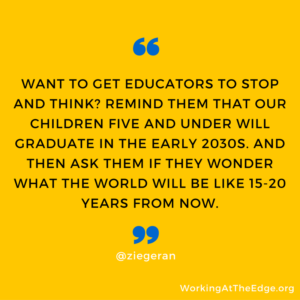 Want to get educators to stop and think? Remind them that our children five and under will graduate in the early 2030s. And then ask them if they wonder what the world will be like 15-20 years into the future. Ask them to go back 15-20 years and notice how much our lives have changed – how jobs and the economy have transformed, how technology has allowed us to personalize so much of our lives and how certain skills have become most valuable as we swim in a sea of both credible and not-so-credible information.
Want to get educators to stop and think? Remind them that our children five and under will graduate in the early 2030s. And then ask them if they wonder what the world will be like 15-20 years into the future. Ask them to go back 15-20 years and notice how much our lives have changed – how jobs and the economy have transformed, how technology has allowed us to personalize so much of our lives and how certain skills have become most valuable as we swim in a sea of both credible and not-so-credible information.
Then ask them if they think K-12 is preparing learners well enough for that imagined future. Need some resources to help create a greater sense of urgency than might already exists? Try this, this or this. Are we playing the long game in education? Or are we ignoring the future – the work of significance – over work of “urgency” such as test prep, archaic teacher evaluation systems and ranking schools based on test scores.
What are we missing that can help us focus on the long game – focus on preparing today’s learners for a VUCA world – one that is (and will continue to be) volatile, uncertain, complex and ambiguous? We’re missing a vision – a compelling vision for learning that will best prepare our learners for the world of the 2030s and beyond.
It’s a lot of work for leaders to listen to the voices of stakeholders, share ideas and data on the world we live in and what it will likely be in the future, and collaboratively develop a vision for learning. It’s not easy managing the distractions of the short game while preparing our organizations – and our children – for the long game. In the development of our Profile of a Graduate and Learning Beliefs, we’ve been guided by these two questions:
- What knowledge, skills and dispositions will our learners need for a successful future, whether graduating in 2017 or 2029?
- What should the learning environment look like for our learners to successfully develop these competencies?
With a clear vision, we can now ask the following question about all of our work – the urgent, important and significant: How does the work (project, initiative, human or financial resource) get us closer to the vision? That’s playing the long game.
Are you playing the long game? What’s your vision? What questions are you asking?
Connect with Randy on Twitter and on the TLTalkRadio podcast!
Get new content delivered to your inbox and the ebook 3 Key Principles of Digital Transformation. The ebook contains valuable information from my experience leading a digital transformation and working with a variety of stakeholders over the past decade.
- A silver lining - January 22, 2022
- Is our use of tech working against us? 🤔 - September 8, 2021
- What’s NOT going to change in the next 10 years? 🤔 - September 7, 2021
My sense is that instructional staff are keenly aware that they aren’t doing all they should to prepare students for the future. What they aren’t aware of is (1) how to determine what preparation students need for jobs 10 or 20 years away and (2) assuming, they could figure that out, how would they fit it into school programs jam-packed with other content?
I blogged about getting students future-ready the last two weeks at posts “Learning to relearn in a digital world” and “Teaching future-ready students: What skills should we teach?”
I’d be happy to have your reaction to my perspective.
https://icanteachwriting.wordpress.com/